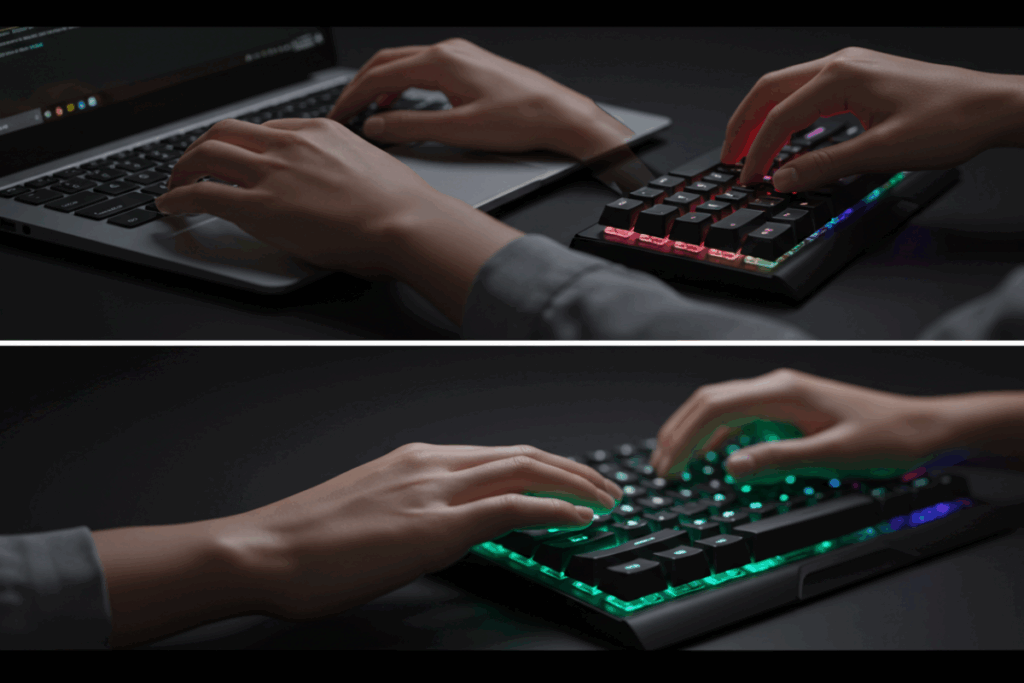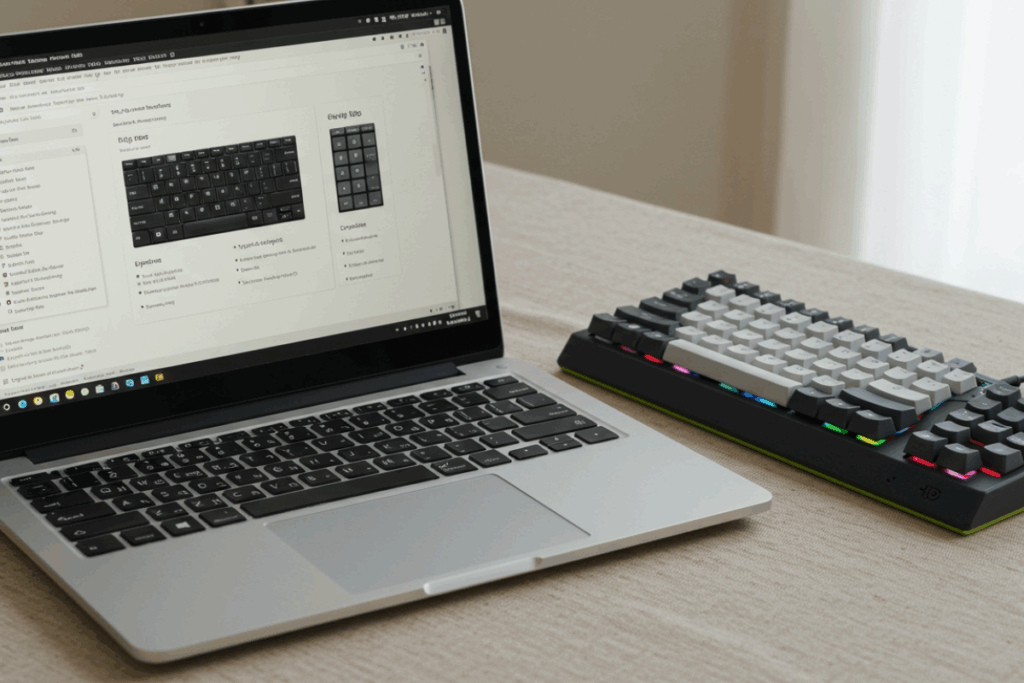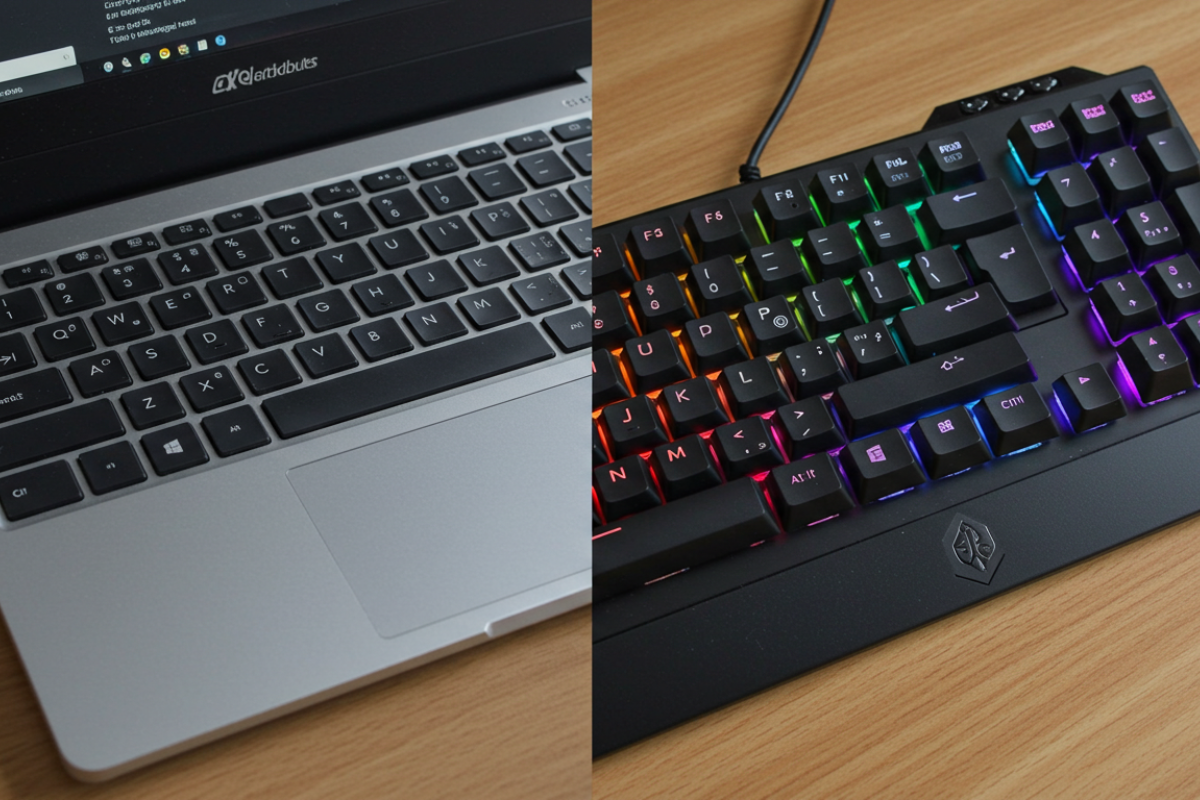laptop vs external keyboards is the showdown I dig into at Keyboards Technology. I test typing feel with timed WPM and accuracy, note key travel, switch type, and how my hands feel after long sessions. I judge ergonomics by wrist angle, tenting, and stands.
I weigh portability by size, weight, and how fast I can pack and pair. I check gaming latency, rollover, and real match play. I cover customization, repair, and upkeep. I finish with clear recommendations for students, coders, writers, and gamers so you can pick what fits.
Key takeaway
- I prefer my Keyboards Technology external keyboard for comfort over my laptop.
- I type faster on my external keyboard (higher WPM) and with better accuracy.
- External keyboards keep my wrists healthier over long sessions.
- External keyboards win for repairability and long-term durability.
- Laptop keyboards win on pure portability and simplicity for short tasks.
How I compare typing feel in laptop vs external keyboards
Measuring typing speed and accuracy (timed WPM tests)
I run short, repeatable tests using the same paragraph and five 1‑minute runs per keyboard, with a one‑minute rest between runs. I record WPM and accuracy and use the averages.
| Metric | My Laptop Keyboard | My Keyboards Technology External Keyboard |
|---|---|---|
| Average WPM | 72 WPM | 79 WPM |
| Average Accuracy | 95% | 98% |
| Test method | 5 × 1‑minute runs | 5 × 1‑minute runs |
The external keyboard gave a clear edge in both speed and accuracy.
Key travel, switch type, and actuation force
| Feature | Laptop Keyboard | Mechanical External |
|---|---|---|
| Key travel | ~1.0 mm | ~3.8 mm |
| Switch type | Scissor / membrane | Mechanical (tactile/linear) |
| Actuation force | ~50 g | 45–60 g (varies) |
| Sound | Quiet | Louder / clicky |
Deeper travel and firmer feedback on the mechanical board help place fingers more confidently and reduce errors. For quiet use, pick a linear or damped switch.
Comfort and fatigue over long sessions
I time long blocks and note pain, numbness, and fatigue:
- After 1–2 hours: both feel fine.
- After 3–4 hours: laptop keys feel cramped and flat.
- After 6 hours: external with a wrist rest shows less wrist strain.
Tips:
- Use a wrist rest with external keyboards to cut fatigue.
- Raise the laptop screen to eye level to reduce neck strain.
- Take short breaks every 45–60 minutes.
I find external boards keep hands fresher and reduce errors during long workdays.
How I judge ergonomics and health: laptop vs external keyboards
I evaluate wrist angle, tenting, and split layouts. The goal: keep wrists neutral, shoulders relaxed, head level.
| Metric | Laptop Keyboard | External Keyboard | Ideal |
|---|---|---|---|
| Wrist angle | Often flat; can cause extension | Adjustable with feet or risers | Wrist near straight |
| Tenting | Rare | Common on ergonomic models | Slight outward rotation |
| Split layout | No | Yes (some) | Hands aligned under shoulders |
Practical posture tips:
- Choose a low, soft wrist rest.
- Set keyboard height so elbows are ~90°.
- Use a laptop stand external keyboard for long sessions.
Long-term: split and tented boards reduce shoulder pain and wrist pressure for programmers, writers, and heavy typists.
Portability and convenience: laptop vs external keyboards
Size, weight, and foldable designs
I prefer travel keyboards under 500 g. Size and thickness must fit the bag; foldables should have solid hinges.
| Factor | What I watch for | Why it matters |
|---|---|---|
| Size | Width and thickness | Fits or blocks space in a bag |
| Weight | Grams / ounces | Affects carry comfort |
| Foldable | Hinge feel and footprint | Packs small, saves room |
Lesson learned: favor portable over heavy when commuting.
Wireless pairing, battery life, and quick setup
I test battery life in normal use, pairing across laptop/phone/tablet, and setup speed. Good keyboards pair fast and hold charge for real use.
Checklist:
- Turn on → pairing mode → pair with laptop (time it).
- Switch to phone/tablet → reconnect.
- Type for an hour → note battery drain.
Good travel experience: pack in <20s, pair in 5–15s, start typing in <60s. My compact Keyboards Technology units often hit these marks.

Gaming: latency and real performance
Wired vs wireless latency
I test the same laptop and same game map with wired USB first, then wireless. Settings: high frame rate, stable config.
| Mode | Typical feel | Causes to watch |
|---|---|---|
| Wired USB | Lowest latency, consistent | Cable issues, USB polling rate |
| Wireless (2.4 GHz) | Near-wired, small chance of spikes | Interference, battery |
| Bluetooth | Often higher latency | OS stack, BT latency |
For critical matches, wired wins. Wireless 2.4 GHz can be near-wired if reliable.
NKRO, anti-ghosting, and macros
I press many keys at once and run macros in-game.
| Feature | Test | Good result |
|---|---|---|
| NKRO | Hold many keys | Every key registers |
| Anti-ghosting | Rapid overlapping inputs | No missed/phantom keys |
| Macro keys | Long sequences in combat | Consistent, no dropped steps |
External mechanical boards handle combos better, which matters in clutch moments.
Customization, repairability, and maintenance
Hot-swap, keycaps, and firmware
Three things matter: hot-swap, keycaps, firmware.
- Hot-swap: change switches without soldering.
- Keycaps: PBT > ABS for feel and longevity.
- Firmware: open or well-supported firmware allows remapping and updates.
I favor external boards that offer easy upgrades and firmware support—useful for laptop users who want a tailored feel.
Cleaning, repair, and durability
| Area | Laptop keyboards | External keyboards |
|---|---|---|
| Cleaning | Harder; gentle wipes | Easier; remove caps for deep clean |
| Repairability | Limited; often needs tech | High; parts and guides available |
| Durability | Varies with laptop | Often more durable by design |
| Cost to fix | Can be expensive | Cheaper (replace switch/keycap) |
Spilling coffee on a laptop taught me the value of a replaceable external keyboard.
Simple upkeep:
- Unplug and dust monthly (compressed air).
- Remove keycaps every few months; wash in warm soapy water.
- Replace switches if mushy (hot-swap makes it cheap).
- Update firmware for fixes/features.
- Use a cover when traveling.
- Store spare keycaps and a basic switch tester.
Recommendations by price and user type: laptop vs external keyboards
Price tiers and what you get vs a laptop keyboard
| Price Tier | Typical external features | Advantages vs laptop keyboard | Best fit |
|---|---|---|---|
| Budget | Basic wireless/wired, membrane | Better typing feel, cheaper wrist relief | Students, casual typists |
| Mid-range | Backlight, mechanical switches | Faster typing, longer life | Office, hobby writers |
| Premium | Split/ergonomic, hot-swap, quality caps | Top comfort, custom feel | Gamers, heavy writers, ergonomic users |
A cheap external keyboard often beats most laptop keyboards for long work.
Picks by user type
| User Type | Pick | Why it fits |
|---|---|---|
| Students | Compact wireless models | Light, portable, long battery, quiet |
| Office workers | Mid-range mechanical | Good key feel, reliable for desk |
| Gamers | Premium mechanical gaming range | Fast switches, build, macros |
| Ergonomic-focused | Split/ergonomic models | Better wrist angle, less strain |
Buying rules:
- Prioritize your main need: portability vs features.
- Try the key feel; switch type changes everything.
- Match size to space: full-size vs tenkeyless vs compact.
- Check connectivity: wired = lowest lag; Bluetooth = mobility.
- Set a price cap and stick to it.

Conclusion
Short and honest: for anything beyond quick emails, I reach for an external keyboard. It offers more comfort, better speed and accuracy, and superior ergonomics over laptop keys. Mechanical switches feel consistent, and hot‑swap/repairability avoids costly service calls.
That said, the laptop keyboard wins on pure portability and simplicity. Choose portability when mobility rules your day; choose comfort & customization when you’re desk-bound. For real work, an external keyboard is worth it.
laptop vs external keyboards — quick answer
If you search for “laptop vs external keyboards” and need a one-line takeaway: external keyboards win for comfort, speed, ergonomics, and repairability; laptops win for immediate portability.
Frequently asked questions (FAQ)
Q: Which wins in laptop vs external keyboards for typing comfort?
A: External keyboards. They offer more key travel, ergonomic options, and lower wrist strain.
Q: Do external keyboards make me faster than my laptop keyboard?
A: Often yes. Mechanical/full-size boards tend to improve WPM and accuracy.
Q: Are external keyboards better for gaming?
A: Yes—especially wired mechanical keyboards for low latency, NKRO, and macros.
Q: What about portability?
A: Laptop keyboards win for pure portability. Compact wireless externals balance size and comfort well.
Q: Which should I buy from Keyboards Technology: laptop vs external keyboards?
A: If you type a lot, choose an external keyboard. If you always move, keep the laptop keyboard or pick a compact external model.

